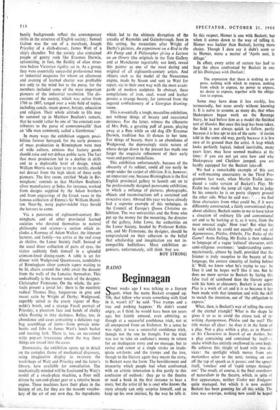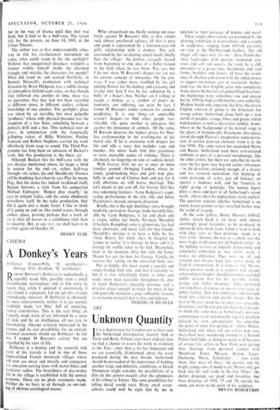Beginnagan
RADIO )COME weeks ago I was talking to a literary agent, when the name Beckett cropped up. `Oh, that fellow who wrote something with God in it, wasn't it?' he said. Two tramps and a tree and nothing happens.' He didn't sound angry, as I think he would have been ten years ago, but faintly amused, even admiring, as though at a successful confidence trick, not at all unexpected from an Irishman. In a sense he was right, it was a successful confidence trick, though not the one he thought. For the trick was not to take an audience's money in return for an inadequate story and no message, but to revive and renew at a single stroke an inade- quate art-form; and the tramps and the tree, though to the literary agent they meant the story, to Beckett were the form. The bewilderment and insecurity which people feel when confronted, with an artistic innovation is due partly to this confusion of outlook : they go to the theatre or read a book in the first instance to hear a story, but the artist (if he is one) who knows the story already can only surprise himself, and so keep up his own interest, by the way he tells it.
In this respect, Homer is one With Beckett; but when it comes down to the way of telling it, Homer was luckier than Beckett, having more choice. Though I dare say it didn't seem so to Homer, more a matter of `Apres moi, le deluge.'
In effect, every artist of stature has had to leap the abyss confronted by Beckett in one of his Dialogues with Duthuil: The expression that there is nothing to ex- press, nothing with which to express, nothing from which to express, no power to express, no desire to express, together with the obliga- tion to express.
Some may have done it less starkly, less tormentedly, but none surely without knowing it. It is naive to assume, as many do, that when Shakespeare began work on the Revenge Story, he had before him as a model the finished text of Hamlet. But once this leap has been taken, the field is not always quick to follow, partly because it is less apt to tire of the same . Id stories told in the same old way, partly because it is less sure of its ground than the artist. A leap which looks perfectly logical, indeed inevitable, many years later, may have seemed madness at the time: if you are not yet sure how and why Shakespeare and Chekhov jumped, you are hardly equipped for the Beckett take-off.
We had a remarkable example of this sort of well-meaning uncertainty in - the Third Pro- gramme last week, when Martin Esslin intro- duced a radio version of Beckett's Play. Mr Esslin has made the jump all right, but to judge by his remarks he is on pretty slippery ground the other side. What he said was : . . we find three characters from what could be, if it were differently constructed, a fairly conventional play about adultery. Beckett seems to me to have taken a situation of ordinary life and conventional art and to be looking at it, as it were, from the most unusual angle.' How true! But what has he said which he could not equally well say of Agamemnon, Phedre, Othello, The Rules of the Game? Arms flailing, Mr Esslin is then reduced to language of a vague 'cultural' character, with semi-religious overtones : `understanding comes mysteriously, almost by itself, provided that the listener is truly receptive to the beauty of the language, the austere sincerity of feeling behind it.' Well, we know what he's trying to say : he likes it and he hopes we'll like it too, but he does no more service to Beckett by laying this false trail of sainthood than the literary agent with his hints at chicanery. Beckett is an artist; Play is a work of art and it is so because it has been made with that intention and with the skill to match the intention, out of 'the obligation to express.'
What, then, is Beckett's way of telling the story of the eternal triangle? What is the shape he gives it so as to avoid the otiose task of re- writing Agamemnon, Phedre and the rest? The title makes all clear: he does it in the form of a play. Not a play within a play, as in Hamlet or Six Characters in Search of an Author, but a play containing and contained by itself—a snake which has entirely swallowed its own body- He achieves this sleight of hand with two de- vices: the spotlight which moves from one motionless actor to the next, turning on and off the tap of speech as it passes; and the speech itself, 'toneless' and of 'rapid tempo through- out.' The result, of course, is the final overthrow of naturalism in the theatre, which, in spite of first appearances, neither. Godot nor Endgame quite managed, but which it is now evident Beckett has been gunning for all this while. The time was overripe, nothing new could be hoped for in the way of drama until that shot was fired, but it had to be a bull's-eye. The tyrant fell, for the present, on June 14, 1963, at the Ulmer Theater.
The author was at first understandably reluc- tant to risk his revolutionary instrument on radio; what could stand in for the spotlight? Without that unequivocal distancer, wouldn't a listener winkle himself inside the charmed triangle and mistake the characters for people? What did stand in, and worked flawlessly, in Bennett Maxwell's production with technical direction by Brian Hodgson, was a subtle change of atmosphere behind each voice, so that though they followed one another in time, there was no guarantee that they had not been recorded at different times, in different studios, without knowledge of one another. The spotlight's place was taken by an invisible, but most palpable `producer,' whose only physical presence was the suspicion of a low buzz, something between a dentist's drill and a bee. This technical tour de force, in conjunction with the frenetically galloping voices of Billie Whitelaw, Pauline Jameson and Robert Stephens, carried the work effortlessly from stage to sound. The Third Pro- gramme has long been an advocate of Beckett's work, but this production is the finest yet.
Although Beckett hits his bull's-eye with the two devices mentioned above, he keeps a third in reserve for the end—or, rather, half-way through—or, rather, the end. Should any Thomas still be doubting that when he says Play he means Play, that his snake has indeed swallowed itself, Beckett borrows a trick from his compatriot Michael Finnagan: 'Repeat play exactly,' he says in reticent italics, and the snake obediently reswallows itself. In the radio production, they did it again just a shade faster. I like to think of it going on and on, like sound waves, through endless space, proving perhaps that a work of art is after all nearer to a confidence trick than to sincerity. But, at any rate, we shall have it in earshot again on October 30.
HENRY TUBE



































 Previous page
Previous page